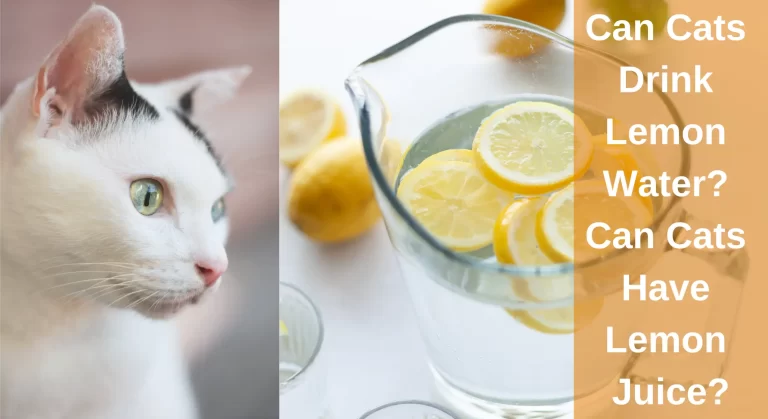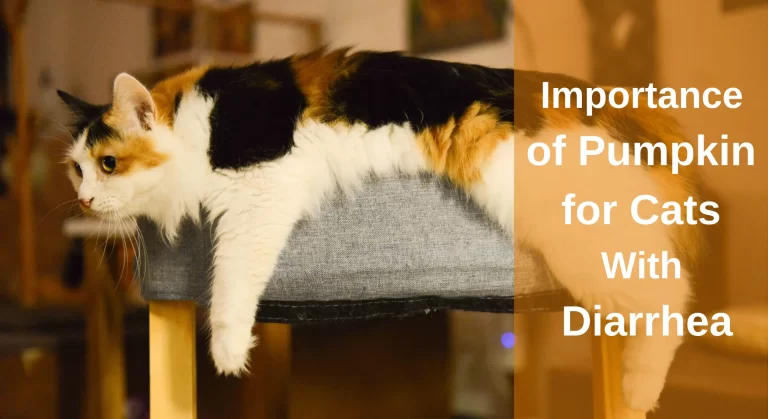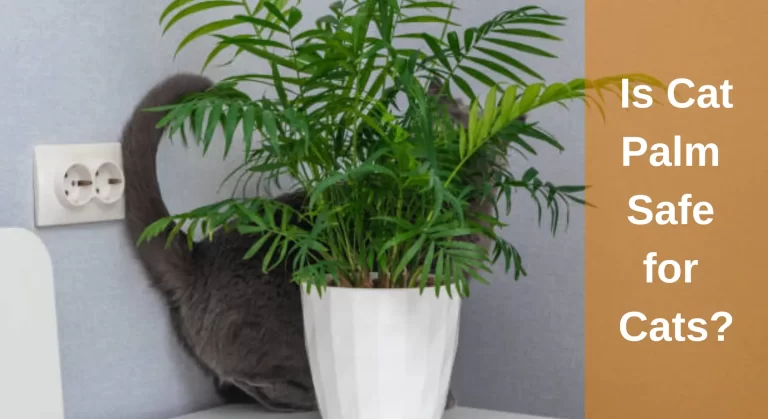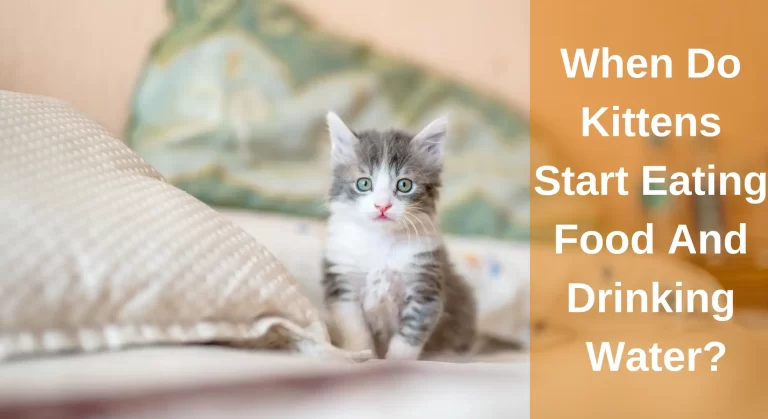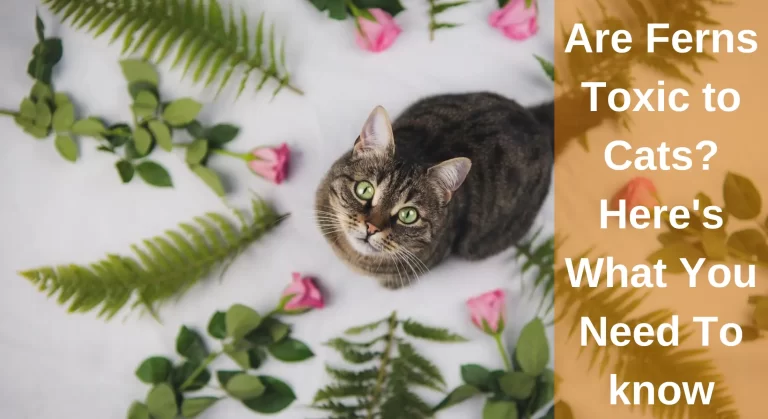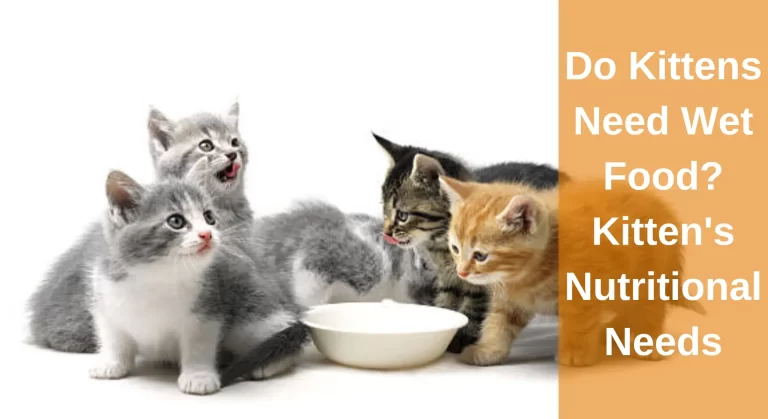Can Cats Eat String Cheese? Examining the Compatibility of String Cheese and Feline Health.
It’s not surprising that many felines enjoy cheese. Your cat will probably eat it up because of the highest protein and fat amount in addition to its delightful taste. But no matter how much cheese your feline enjoys, it’s clear that its stomach can’t digest the fatty content of cheese. Therefore, most cat owners become worried and ask if can cats eat string cheese like us.
Despite the fact that most felines like a big slice of string cheese, it is not recommended, and it isn’t the healthiest treat for felines. String cheese has a lot of fat and salt, both of which are bad for cats. String cheese should never be given to your cat since it may also pose a choking risk.
Cats are obsessed with string cheese, and if any is available, they will love to eat it. But whether it’s healthy or dangerous for them? In this article, you will discover the fundamentals concerning string cheese and felines, why felines love it, what happens if they consume large amounts of it, and when you should be concerned about them.
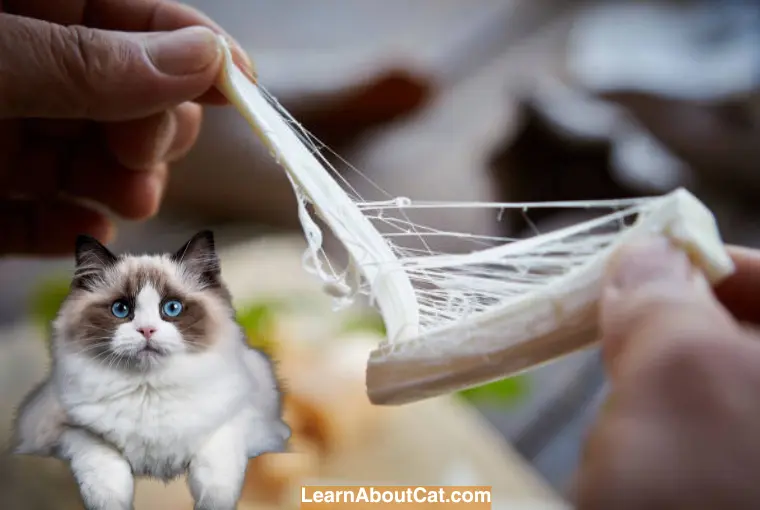
What Exactly Is String Cheese?
String cheese consists of natural components such as milk, yeast, and an essential enzyme that is used to transform milk into a viscous froth. Freshly made mozzarella is sliced into strands rather than molded into balls; the strands are then spread out repeatedly. While string cheese is made entirely of mozzarella cheese, fresh mozzarella is softer and smoother.
The main distinction between fresh mozzarella and string cheese is that the latter is prepared with optimum moisture, whereas fresh mozzarella is preserved in liquid or salty water.
In general, string cheese has a hard and robust quality, while certain varieties can crumble and have a thread flavour. There are numerous types of string cheese, each one with a special flavour and texture.
These cheeses all have distinctive flavours that go well with various foods. So, to summarize, string cheese is essentially just mozzarella that has been stretched a lot.
Nutritional Value of String Cheese
String cheese is a good source of protein, calcium, and vitamin D. One stick of string cheese (28 grams) contains approximately 80 calories, 6 grams of protein, 7 grams of fat, and 20% of the daily recommended intake of calcium for adults.
Can Cats Eat String Cheese?
Cats must not eat string cheese. They can eat it in small amounts, but excessive amounts can give them sickness, diarrhoea, and gastrointestinal problems. While Stringy cheese itself is not toxic to cats, it is not a natural part of their diet and is nutritionally worthless. The body is not given any nourishment or energy from it. It contains a lot of fat, which is bad for your overall health.
Cats only fulfil their nutrient requirements from their meals which basically comprise meat because they are obligate carnivores.
But due to the high protein level, stringy cheese might irritate a cat’s sensitive digestive tract because dairy is indigestible by cats.
Check Out: Can Cats Drink Oat Milk?
Is String Cheese Bad for Cats? Does Cheese Give Cats Diarrhea?
Cheese is not good for a feline’s health and isn’t a major constituent of their nutrition. Although feeding cats a lot of string cheese or other types of milk-based products is not advised, little servings of string cheese might not be detrimental to cats.
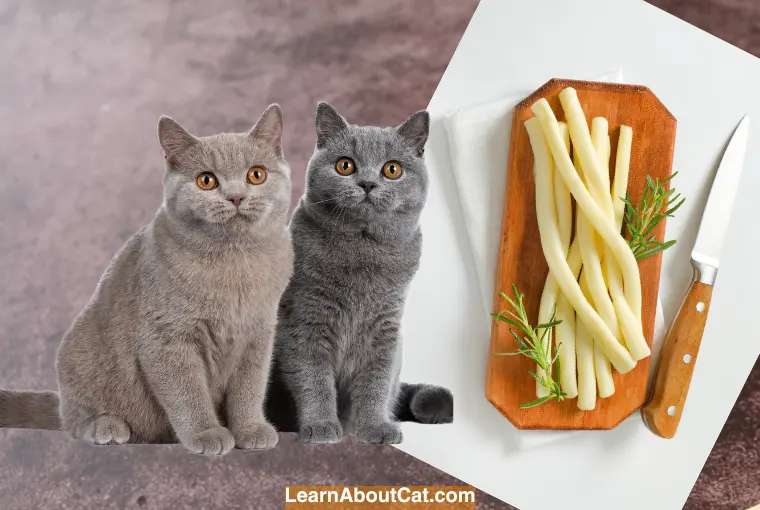
The majority of felines are lactose intolerant meaning they lack the enzymes required to break down lactose, a sugar present in dairy items such as milk, making them generally lactose sensitive. Eating milk products might result in stomach problems like diarrhoea, nausea, and pain in the abdomen.
Moreover, string cheese, in particular, is a type of processed cheese that might include preservatives and other ingredients that are bad for cats.
Also, the excessive amount of salt in stringy chees can be harmful to cats because it can cause severe diarrhoea and other medical problems.
Also, Check Out: Can Cats Eat Vanilla?
What Happens if a Cat Eats Some String Cheese? List of Side Effects of String Cheese on Cats:
When a cat consumes cheese, it could have digestive problems like:
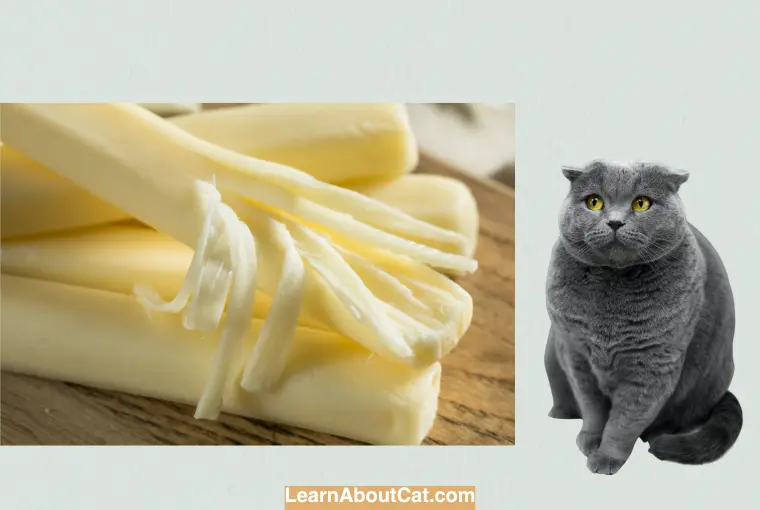
- Diarrhoea: Felines typically have lactose intolerances, so eating cheese can cause diarrhoea and other stomach disorders.
- Nausea: A feline’s stomach may become irritated by cheese, which may result in nausea.
- Abdominal disturbances: Felines who consume cheese may have stomach discomfort and severe pain.
- Dehydration: Cheese consumption can be detrimental to cats because of the high salt level in it which can also lead to high blood pressure and other health issues in cats if consumed in excess.
- Obesity: As cheese contains a lot of fatty acids and calories, continues consumption of cheese might result in being overweight and other associated medical conditions. Overweight cats are at a higher risk of developing health issues such as diabetes and joint problems.
- Pancreatitis: Consuming fatty meals like cheese may cause a dangerous problem known as pancreatitis, which is an infection of the pancreatic tissues.
- Allergic issues: Some felines might be intolerant to cheese, which may result in signs like skin rashes, irritation, and breathing difficulties.
It’s advisable to never give felines cheese or other kinds of dairy items.
You Might Like to Find Out: Can Cats Drink Buttermilk?
How Much String Cheese Can Cats Have?
Cats are typically lactose sensitive and may experience difficulty absorbing lactose, a substance present in dairy goods and milk, therefore even little quantities of stringy cheese such as one cube can upset their stomachs. It is not advised to give cats a lot of cheese because they don’t need to eat it as a major constituent of their diet.
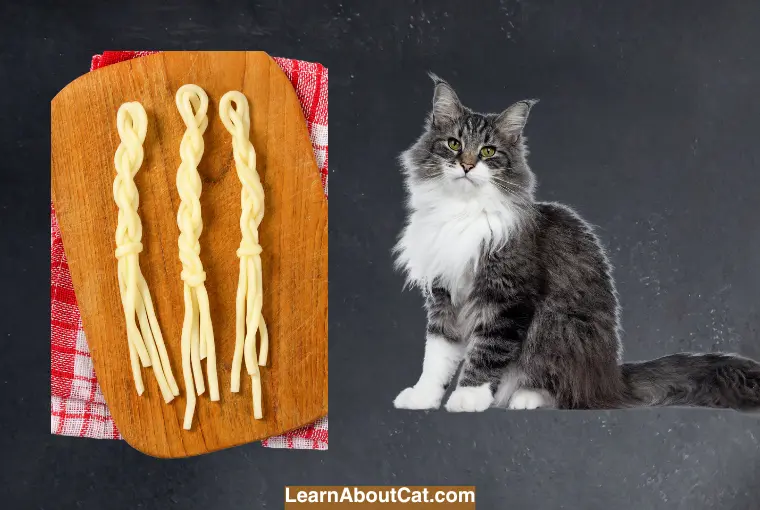
If you want to give your feline some cheese, then it is recommended to pick a cat-specific cheese that is produced according to their nutritional requirements and doesn’t contain lactose or any other harmful ingredient.
Moreover, to prevent overheating and associated health issues like being overweight, limit the meal size and restrict the quantity of snack you offer your felines if it contains cheese.
How to Feed String Cheese to Your Cat
If you decide to feed string cheese to your cat, it is essential to do so in moderation. You should also ensure that the cheese is fresh and does not contain any additives or seasonings that may be harmful to cats.
It is best to cut the string cheese into small pieces or shreds to make it easier for your cat to chew and digest. You can also mix it with your cat’s regular food to make it more palatable.
It is important to note that string cheese should not be given to kittens or cats with health problems without consulting a veterinarian first.
What Should You Do If Your Cat Eats Too Much String Cheese?
If your feline consumes an excessive amount of string cheese, keep an eye out for any symptoms of gastrointestinal distress, such as nausea, vomiting, diarrhoea, or thirst.
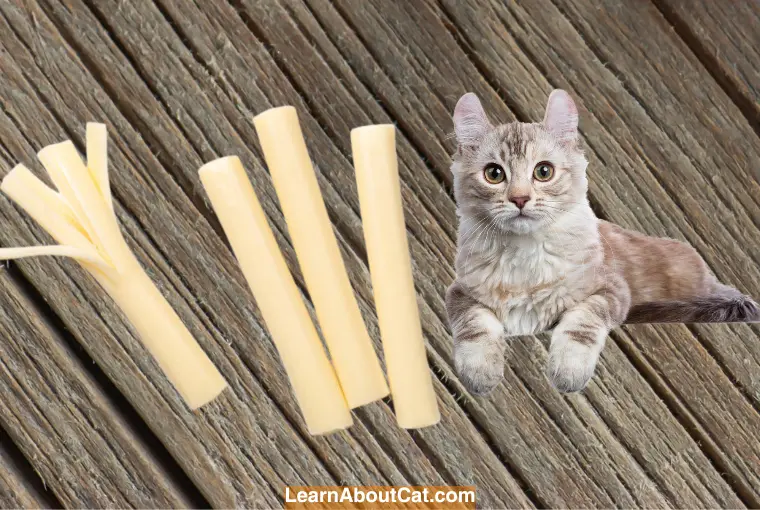
You must call your veterinarian right away if your feline exhibits one or more of these signs or otherwise seems ill.
Your veterinarian may occasionally advise therapies that make your cat feel better, such as medicine for treating vomiting or diarrhoea or IV fluids to make them hydrate if they get exhausted.
Moreover, once your cat is fine it’s crucial to keep cheese out of their reach and to refrain from giving them meals that aren’t prepared exclusively for cats.
As an alternative, give your feline nutritious, feline-specific snacks occasionally, and always get your veterinarian’s approval before adding different foodstuffs or treats to your feline’s menu.
When to Take Your Cat to The Veterinarian?
There are many cases wherein you need to bring your feline to the veterinary clinic. Common symptoms that show your feline may require medical care involve:
- Appetite variations or anorexia: If your feline is consuming less than normal or is thinner, this could be a sign of a health issue.
- Tiredness or a drop in physical activity: If your feline isn’t acting as lively or energetic as normal, it could be an indication of sickness or discomfort.
- Vomiting or diarrhoea: If your feline is frequently vomiting or having diarrhoea this could be a sign of a digestive issue or another underlying medical condition.
- Breathing problems: If your feline is experiencing trouble breathing, it’s crucial to get medical assistance right away because it might be an indication of a major respiratory problem or heart disease.
- Urinary habits issues: A UTI or another health problem may be indicated by abnormalities in your feline’s urine or litter tray behaviours, such as increased frequency, trouble urination, or peeing out of the litter box.
- Behavioural differences: If your feline is acting strangely or aggressively, it could be an indication of a problem with its health or suffering.
- Skin issues: Skin sores, irritation, or baldness in your feline could be signs of allergies, infection, or any other skin disorder.
If your cat demonstrates any of the above indications along with any other strange ones, it’s critical to get help from healthcare professionals. Severe health issues can frequently be avoided with early diagnosis, which also enhances the effectiveness of therapy. Also, it’s critical to have regular wellness examinations to maintain your feline’s health.
Alternatives to String Cheese for Cats:
There are several possibilities when deciding whether to feed your feline human food items except for string cheese as a healthier snack. But before feeding alternative human meals to cats, consult your veterinarian and assess your cat’s total nutritional requirements. You’ll have to take precautions if they follow a restricted diet.
Remember that your cat can only give these meals plain. Additional seasonings like pepper, curries, or flavors may be hazardous to your feline. Here is the list of some food items that serve as a safe alternative to cheese but must be given in moderation:
- Scrambled eggs
- Pumpkin or mashed potatoes
- Deseeded fruits
- Cooked vegetables probably mashed or cut into small pieces
- Snacks specially made for cats
- Cooked beef, chicken or turkey without the bones and skin
- Small pieces of cooked fish
- Fresh fruits and vegetables such as blueberries, carrots, and cucumbers
Find Out: Can Cats Eat Human Food? List of Human Foods That Cats Can and Cannot Eat
Frequently Asked Questions
What types of cheese can cats eat?
If you’re considering serving cheese to your feline, it’s important to consider the ingredients because not all cheeses are produced with the same components. Harder cheeses like cheddar, ricotta, mozzarella, cottage cheese, and Parmigiano are suitable for cats, but only in small amounts and in moderation.
They can be digested easily by your felines’ stomachs because they contain less lactose. Moreover, the least lactose-containing one for your cat is goat cheese.
However, hard cheese has a greater salt ratio than softer ones so it’s advised to feed them in small quantities.
What about vegan or non-dairy cheeses?
Sadly, no. These cheeses are unsuitable for felines to eat since they are extremely processed and have high sodium and fat content.
Why is my cat obsessed with string cheese?
It’s not unusual for cats to become obsessed with string cheese as this cheese contains high protein content and a chewy texture that attracts felines. Moreover, the stringy feel of this cheese also appeals to them that’s why they love to eat string cheese.
Can cats eat mozzarella string cheese?
Technically Yes, felines can consume mozzarella string cheese in moderation but it is not recommended, and it shouldn’t be a major component of their nutrition. Due to its high saturated fat and calorie content, cheese can cause obesity and gastrointestinal problems in felines when consumed in excess. If you’d like to offer your feline this cheese as a reward, keep in mind you only give it to them in small amounts. To prevent choking dangers, it is recommended to chop the cheese into little chunks.
What cheese is poisonous to cats?
Some cheeses may pose harmful effects if consumed by your felines including, blue cheese, processed cheese, swiss cheese, and some hard cheeses that contain a high salt ratio.
How can I tell if my cat is choking on string cheese?
Signs of choking in cats may include gagging, coughing, and difficulty breathing. If you suspect your cat is choking, seek veterinary care immediately.
Final Words
It shouldn’t pose any trouble if you give your feline some string cheese, but ask your cat’s veterinarian if doing so is safe for your feline friend. While if your feline consumes a large amount of string cheese, he may get diarrhea or other gastrointestinal issues.
So, it’s not a healthy decision to feed your feline stingy cheese due to its high-fat content or salt concentration in it. Moreover, if your feline insists you feed him cheese, just give him a small cube and keep an eye on them for any negative impact.
Also, you can try other healthy alternatives for making your feline smile and fulfilling his cravings.
Related Posts:
Who is Isabella?
My name is Isabella, and I am a dedicated and knowledgeable cat enthusiast. With years of experience caring for cats and a deep love for felines, I made a mission to help other cat lovers navigate the challenges of cat ownership.

